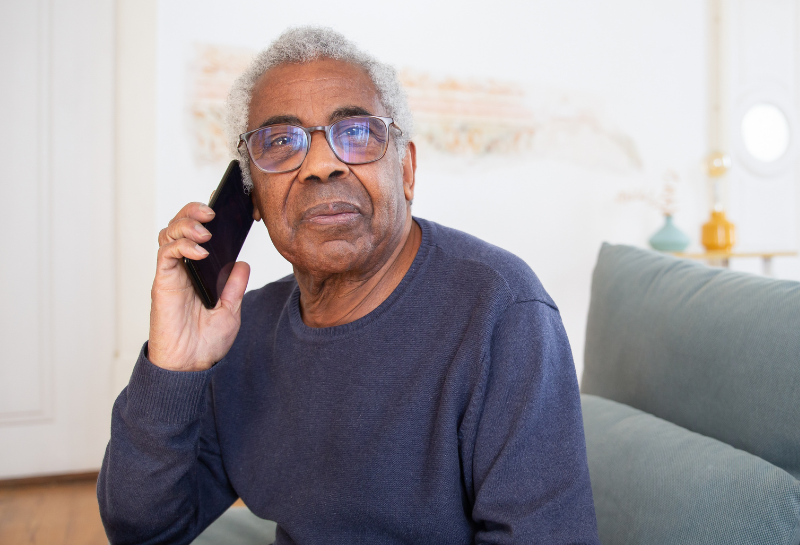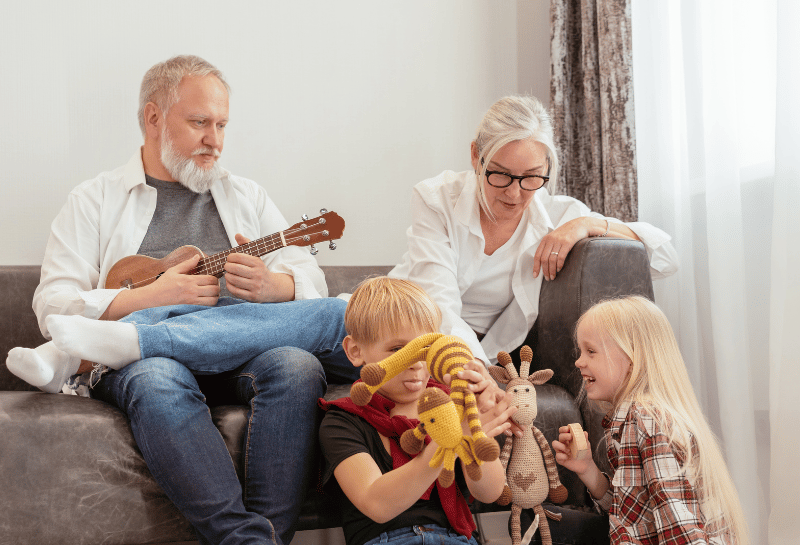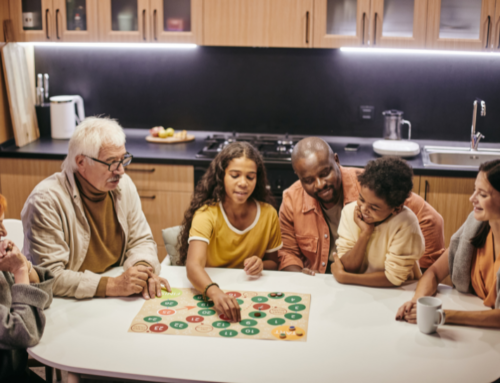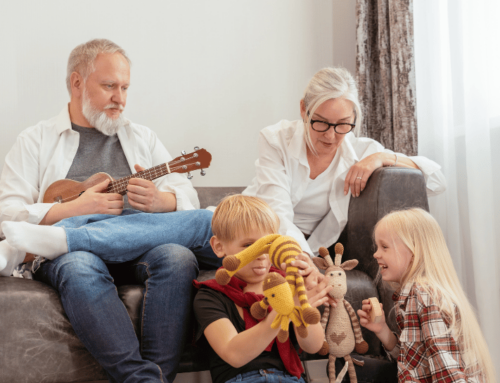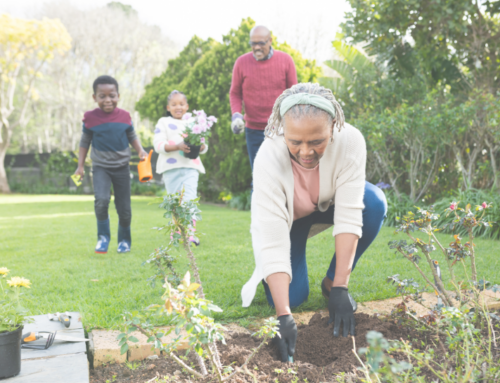Preparing Seniors for a Cozy and Safe Winter: Tips for Families and Caregivers
For many seniors and their families, the approach of winter brings to mind images of the warmth of holiday gatherings and the comfort of fireside warmth. However, this enchanting season can also present distinct challenges, particularly for those who have chosen to age in the familiar surroundings of their own homes.
The colder weather, shorter days, and often gray skies can create a sense of isolation, especially for seniors living alone. As winter draws near, seniors and their families must prepare for the chill and maintain the warmth of well-being.
Well-being for seniors extends beyond physical health; it encompasses the overall quality of life. It means feeling content, secure, and fulfilled. It involves staying mentally and emotionally engaged and feeling connected to a supportive community. Well-being ensures that seniors embrace each day optimistically and continue to savor life, even during winter challenges.
There are valuable tips for supporting the seniors in your life and community as the winter comes. Being prepared and accepting available help can make life more manageable and enjoyable for you, your loved one, and your caregivers.
Seek Assistance When Needed
The first and most crucial tip is to seek help by finding the aging-in-place organizations in your community. If you have the role of caregiver, whether a family member or friend, getting support from senior support services will be a positive addition and serve your well-being. There is no need to “go it alone.”
Aging-at-home programs are lifelines for seniors and caregivers who need assistance with daily tasks. For family members and caregivers, these services offer essential support during the winter months. Services such as well-being checks, home repair, exercise programs, community meals, and more ensure seniors receive the care they need to remain safe and healthy.
Aging-in-Place Services and Support
The first and most important tip is to locate the senior support services or aging-in-place programs in your community.
As we head into winter, the following crucial tips are vital for the well-being of seniors choosing to live alone at home, and age-at-home programs play an essential role in supporting these efforts through their wide range of services.
There are actionable steps that seniors, their families, and caregivers can take to prepare for winter. These practical strategies ensure seniors’ safety, security, and well-being and illustrate how aging-at-home programs are a vital support system to help them through the colder months.
Stay Connected, Stay Warm
As the days grow shorter and the desire to remain indoors increases, maintaining physical and emotional warmth becomes even more critical.
Seniors who live alone can feel isolated during the winter months. This is where connection and engagement play a vital role. Ways you can engage with your senior during the winter months:
-
- Set up regular calls to check in. Regular communication helps isolated seniors keep the blues at bay, whether a phone call or video chat. Use these times to find out how they’re doing and what they need. Consider engaging volunteers from aging-in-place non-profits to call as well.
-
- Ensure they have all the necessary supplies, from medications to food, warm clothing, and blankets. If you can’t do this, ask a friend, neighbor, or senior support services to assist you and your loved one.
-
- Visit them more frequently or arrange for someone to check in on them. Find help through neighbors or in your community through an aging-in-place non-profit. They work through the winter and help keep the senior population engaged through friendly visits, calls, and activities.
-
- Find local organizations that provide activities and ways to promote stimulation, engagement, and socialization. Taking your loved one out of the house for fresh air or a game of cards, bingo, shared meals, or exercise are all activities that promote mental and physical well-being.
Winterize Your Senior’s Home
The safety and warmth of home are paramount during winter. Consider these tips to ensure safety:
-
- Schedule a snow removal service when needed
- Put together an emergency kit — Click here for recommended items to include.
- Ensure smoke and Carbon Monoxide detectors are working and the batteries are new.
- If possible, don’t use space heaters.
- Have extra blankets handy in places where seniors like to sit. Having multiple reduces the need to move them and avoid tripping on them.
- Ensure that heating systems are in working order (indoor temperature should be 65 degrees or warmer), add insulation to keep the cold at bay, and check windows and doors for drafts. Encourage a professional furnace check-up to check for air filters, carbon monoxide leaks, dirty pilot lights, etc.
Aging-in-place organizations often offer services that help seniors winter-proof their homes to create welcoming environments and provide safety, reducing the risk of accidents. You can rely on these support programs to assess and improve the home’s suitability for the winter season.
Healthy Meals and Hydration
Eating well is crucial for maintaining energy and health during the winter and preventing illness by strengthening the immune system.
Staying hydrated and eating warm and nutritious meals ensures seniors remain physically fit and helps reduce depression. As we age, our thirst diminishes, leading to lower fluid intake.
On top of lower fluid intake, seniors retain less water, so the risk of dehydration increases, and with the lower humidity indoors because of heating, dehydration can happen faster than expected. In addition, many medications cause seniors to become dehydrated or incontinent. When seniors become dehydrated, they can become weak, disoriented, confused, experience muscle cramps, and can experience falls.
Senior support services often provide meal preparation services, deliver warm and nutritious meals to seniors, or host community meals at a local restaurant. This ensures that seniors have access to nourishing food when they don’t have enough food at home or may not feel like venturing out in the cold.
Volunteer and Make a Difference
Volunteers are needed and welcome in the senior support services community.
Volunteering with aging-in-place organizations is a much-needed role and a rewarding way to make a positive impact during the winter season.
Volunteers perform the essential services aging-in-place organizations provide, including friendly phone calls, home visits, companionship, and more. Their presence and assistance ensure that seniors’ practical needs are met and offer the invaluable gift of human connection.
Volunteers can become a lifeline for seniors, providing practical assistance and the warmth of companionship during this season. Volunteers become friends who bring joy to older adults and help them stay connected to alleviate isolation and feelings of loneliness. Seniors look forward to visits from volunteers and many times, the volunteer is the ONLY human a senior sees all week.
Families living far away from their loved ones and local caregivers appreciate volunteers’ extra support, knowing loved ones are not alone. And for volunteers, the satisfaction of making a difference in a senior’s life is immeasurable.
*NOTE — “If you or someone you know is already receiving care and services from an aging-in-place organization, consider donating financially to support what they do. Most AIP organizations are donor-supported, meaning the more financial support they receive, the more services they can provide, and the more seniors and their families they can help.
Encourage Regular Exercise
Regular exercise helps maintain mobility and physical health and is vital to mental and emotional well-being. Physical activity can improve mood, boost energy levels, improve balance and reduce the risk of falling, manage chronic conditions like diabetes and arthritis, and reduce the risk of seasonal affective disorders.
Staying active is crucial for seniors’ well-being, and many aging support programs offer tailored exercise classes designed to meet their specific needs. These programs provide a supportive and safe environment for seniors to engage in physical activity, even during winter.
In addition to structured classes, seniors can enjoy activities like indoor walking, chair exercises, and yoga, all of which can be facilitated by aging support programs.
Hobbies and Interests
Nurturing hobbies and interests can provide a feeling of warmth for seniors. Engaging in activities they’re passionate about, such as reading, painting, knitting, or exploring new interests through online courses, is more than a pastime— it’s a way to improve mental health, decrease the risk of chronic conditions, increase social connections, and ward off loneliness.
Your community aging-in-place organization may offer programs such as exercise, book clubs, or special events throughout the year to promote connectedness.
For seniors who can’t or won’t leave their homes, the services provided by senior age-at-home organizations include volunteers who can go to their homes, spend time with them, engage in hobbies, conversations, games, and more. Again, the meaning of volunteering to spend time with a senior at home during the winter months is priceless.
For families, knowing that their loved ones are engaging in meaningful activities offers peace of mind, and for volunteers, enjoying these hobbies alongside seniors can create bonds that brighten everyone’s winter.
A Final Thought
It’s abundantly clear that the health and well-being of our older loved ones during the winter isn’t a solitary effort. It’s a collective endeavor that involves families, caregivers, and the invaluable support of aging-in-place services.
By seeking assistance when needed, ensuring their homes are winter-ready, ensuring they have nourishing meals, volunteering, and encouraging exercise, we create an environment where seniors thrive during winter.
By dedicating purposeful attention, time, and financial support to staying connected, nurturing hobbies and interests, and recognizing the positive influence of aging-in-place organizations, we ensure that these collective efforts contribute to the coziness, safety, and connection our seniors need.
Click here to explore the resources available to ensure a cozy and safe winter for your loved one through your local aging-in-place organization, DSCC — DuPage Senior Citizens Council.
Sources
- University of Nebraska, Safety at Nebraska
- Sixty + Me, Winter Hydration and Why It Matters, 12. 2022
- PhysioEd, The Value of Exercise for Older Adults, 07.2023
More Articles That Might Interest You
The Caregiving Balancing Act: Support Systems for the Sandwich Generation
The Caregiving Balancing Act: Support Systems for the Sandwich Generation Are you juggling the dual roles of [...]
HR Champions of Aging-in-Place: Fostering Intergenerational Connections
HR Champions of Aging-in-Place: Fostering Intergenerational Connections Attention HR leaders and professionals! “ The more HR and [...]
Bridging Generations: Engaging Activities for Seniors and Youth
Bridging Generations: Engaging Activities for Seniors and Youth Pt. 2 Calling all adult children of seniors, parents, [...]


